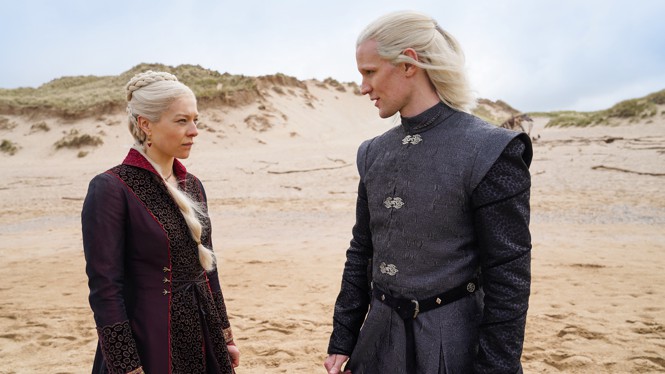
This article contains spoilers through the first episode of House of the Dragon.
While I was parsing how I felt about House of the Dragon, HBO’s lavish, sweeping new entry in the Game of Thrones universe, I came across an interview given to the Daily Mail by an alleged “Hollywood executive” connected to the series. What was striking was the bifurcated way the person described the show’s framing for a post-#MeToo moment: conceding that there was “way less sex” in House of the Dragon than there could be in the good old tits-and-trebuchets days of yore, but also boasting that producers had cleverly adapted to the times by replacing sexual violence with barbaric renderings of childbirth. “The child bed is our battlefield,” the source said, quoting a line from the first episode. (Onscreen, the line is spoken by the pregnant Targaryen queen Aemma, played by Sian Brooke, shortly before she goes into labor. Such “discomfort,” she explains, “is how [women] serve the realm.”) Think about this statement for a moment—that sexual violence is so fundamental to a franchise’s ethos that it has to be replaced with some other portrayal of primal female pain and suffering lest viewers lose interest—and your head might spin. (Mine whirled like a Hula-Hoop.)
House of the Dragon is a gorgeous series, replete with the visual splendor and wanton extravagance you might expect: reptilian CGI dragons, wigs as white as snow, more candles aflame than in all of Vatican City. But it also seems to strain at times with the possibly cynical effort of countering Game of Thrones’s casual degradation of women. You can virtually see the proto-feminist architecture being assembled. (Strong female leads! Sexual empowerment! An acknowledgment of the physically brutal and life-threatening reality of bearing children!) The show, based on a prequel history of the Targaryen family (which George R. R. Martin published as Fire & Blood in 2018), begins 172 years before the birth of Daenerys Stormborn, the platinum-haired dragon queen in Thrones, and is in large part about the obstacles that stand in the way of women achieving and exerting power. Female characters school one another on patriarchal constraints (“Men would sooner put the realm to the torch than see a woman ascend to the Iron Throne”), affirm their authority (“I am the crown, Ser Criston. Or I will be”), and issue savage clapbacks (“And how have you served the realm, Lady Redwyne? By eating cake?”). And yet, the most glaring flaw in the show for me comes down to one thing that the supposed insider didn’t mention, and that very few reviewers so far have objected to: HBO’s hottest new series is all about incest.
[Read: What the sexual violence of Game of Thrones wrought]
This isn’t just a question of taste or your personal ability to stomach love scenes between people who share an uncomfortable amount of genetic material. It also comes down to character development and narrative potential, two elements that, I’d argue, made Thrones such a compelling show, sordid abuse and flagrant brutality aside. On the earlier show, the incestuous tradition of the Targaryen dynasty was an unfortunate and distasteful element that you could largely sideline if you wanted to, like cilantro or the comedy of Dane Cook. It was present—most centrally in the sexual relationship between Jaime and Cersei Lannister, which Cersei justified by invoking the Targaryen tradition of marrying brothers and sisters—but not predominant until the final season, when Jon Snow and his aunt Daenerys made unfortunately literal the union of ice and fire. But House of the Dragon attaches itself intimately to the Targaryens, a dynasty built on one of the most fundamental kinds of transgression. Even putting aside the yech factor (and I found it hard to, in one episode, when a character suggests marrying his teenage daughter to her 2-year-old brother), what this creates is a world that’s inherently toxic and therefore dramatically deadened.

House of the Dragon is set, an unseen narrator reveals, during the first century of the Targaryen dynasty. At the outset, the elderly King Jaehaerys convenes a council to name his chosen heir. His successor, Viserys (played by Paddy Considine), is a gentle, platinum-haired lunk with a propensity for bodily infection. (His physical disintegration over the course of the series reads like a heavy-handed visual allusion to his family’s moral degradation.) His wife, Aemma, has borne him one daughter, Rhaenyra (played by Milly Alcock as a teenager and Emma D’Arcy as an adult), who’s keenly aware that her father would rather have a son. In the first episode, Aemma’s grueling breech birth turns into a death sentence via C-section when her husband gives the doctor permission to cut her child out, even as she screams and begs for her life. The baby, a boy, lives only an hour or two, leading the guilt-stricken, now-widowed Viserys to do the unthinkable and name Rhaenyra his heir.
Lurking on the sidelines is Viserys’s brother, unsubtly named Daemon (Matt Smith), who glowers in one locale before donning his cloak, going somewhere else, and glowering there. The dynamic between the adult Daemon and the 15-year-old Rhaenyra is immediately, grotesquely charged; they converse, intimately, in High Valyrian, and he looks at her with the loaded interest of a cat eyeing a bird. By the end of the first episode, the grieving Viserys is also being comforted by Rhaenyra’s best friend, the teenaged Lady Alicent Hightower (Emily Carey), who has been compelled by her morose father (Rhys Ifans) to attend to the monarch despite her obvious reservations.
Without spoiling any story lines, what I found most notable about basing a series on an incestuous royal line is the flattened relationships it establishes between the characters. For all the tortured family dynamics of Game of Thrones, the show depicted many people who loved their children unreservedly, even if that was their only redeeming quality. As narcissistic and megalomaniacal as Cersei was, her affection for her kids—including after one revealed himself to be psychopathically cruel—was real, and added fascinating texture to her character. On House of the Dragon, no primary relationship seems to be truly insulated from erotic desire, which is itself inextricable from the quest for power. That seems to mean that, at least in the first six episodes made available to critics, virtually every plotline and motivation feels the same, and there may be no heroes, ultimately, to root for.
As a TV-watching audience, we proved remarkably resilient to the incestuous relationships Game of Thrones offered up in the past; it helped that Jon Snow appeared to be reasonably nauseated by the idea of making love to his aunt once he knew that she was his aunt. But I can’t help wondering whether HBO would launch a mind-bendingly expensive show—its new Sunday-night anchor—about a royal dynasty in which siblings hoard power by marrying one another (sometimes in polyamorous throuples) if viewers weren’t already demonstrably attached to the intellectual property at hand. The default defense George R. R. Martin offered whenever Game of Thrones offended people was that everything he conceived really happened in our world at one time or another. Intermarriage among nobility falls under that same rubric, as my colleague Megan Garber explored in 2017, and incest in literature can offer authors a vehicle for probing issues of insularity, narcissism, and violation. But on television, in a show so entirely preoccupied with spectacle, there’s much less space for psychological subtlety. Watching the Targaryens interact, in high definition, might induce discomfort. And the storytelling is suffering right alongside us.







